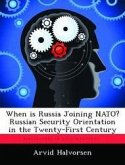The current operating environment faced by the United States military presents many challenges based on the global nature of United States strategic interests. Pursuant to these interests is a need to operate in, and effectively communicate with, a wide variety of audiences on the international and domestic scene. The demands of society firmly entrenched in Western democratic ideals necessitate a transparent approach to strategic communication. In an attempt to better deal with these demands, the United States military has devoted much thought and effort into growth in the area of strategic communication. Even with the effort expended to date, the United States military still could learn much from the experiences of other states. One state that appears to have learned some hard lessons related to strategic communication is the Russian Federation. After the dismantling of Soviet government structures following the demise of the Soviet Union in 1991, the Russian government struggled to cope with the difficulties of government transparency associated with conversion to a government resembling those of Western democratic states. Specifically, the rapid rise in number and prominence of independent media outlets presented problems for a struggling government with little experience dealing with media outlets they did not directly control. The changes in media coverage of significant government events, such as the Chechen wars, point towards increased awareness and capability in the arena of strategic communication from the Yeltsin to Putin administrations. No look at Russian strategic communication during the Presidencies of Boris Yeltsin and Vladimir Putin would be complete without some discussion of reflexive control and its presence in Russian strategic thought. With the Putin administration dominated by former FSB officials throughout all government offices it should be hardly surprising that reflexive thought has become increasingly prominent. This lends support to t
Hinweis: Dieser Artikel kann nur an eine deutsche Lieferadresse ausgeliefert werden.
Hinweis: Dieser Artikel kann nur an eine deutsche Lieferadresse ausgeliefert werden.








